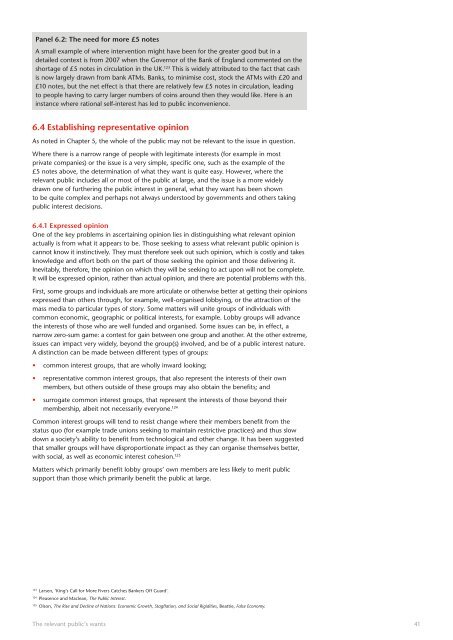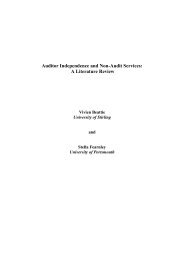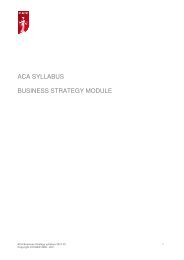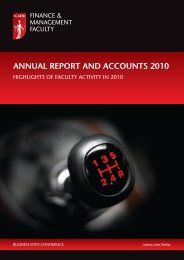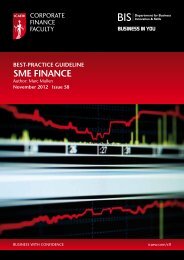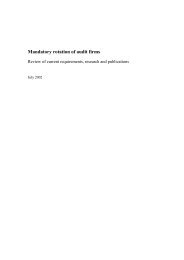Acting in the public interest â a framework for analysis - ICAEW
Acting in the public interest â a framework for analysis - ICAEW
Acting in the public interest â a framework for analysis - ICAEW
- No tags were found...
Create successful ePaper yourself
Turn your PDF publications into a flip-book with our unique Google optimized e-Paper software.
Panel 6.2: The need <strong>for</strong> more £5 notesA small example of where <strong>in</strong>tervention might have been <strong>for</strong> <strong>the</strong> greater good but <strong>in</strong> adetailed context is from 2007 when <strong>the</strong> Governor of <strong>the</strong> Bank of England commented on <strong>the</strong>shortage of £5 notes <strong>in</strong> circulation <strong>in</strong> <strong>the</strong> UK. 123 This is widely attributed to <strong>the</strong> fact that cashis now largely drawn from bank ATMs. Banks, to m<strong>in</strong>imise cost, stock <strong>the</strong> ATMs with £20 and£10 notes, but <strong>the</strong> net effect is that <strong>the</strong>re are relatively few £5 notes <strong>in</strong> circulation, lead<strong>in</strong>gto people hav<strong>in</strong>g to carry larger numbers of co<strong>in</strong>s around <strong>the</strong>n <strong>the</strong>y would like. Here is an<strong>in</strong>stance where rational self-<strong>in</strong>terest has led to <strong>public</strong> <strong>in</strong>convenience.6.4 Establish<strong>in</strong>g representative op<strong>in</strong>ionAs noted <strong>in</strong> Chapter 5, <strong>the</strong> whole of <strong>the</strong> <strong>public</strong> may not be relevant to <strong>the</strong> issue <strong>in</strong> question.Where <strong>the</strong>re is a narrow range of people with legitimate <strong>in</strong>terests (<strong>for</strong> example <strong>in</strong> mostprivate companies) or <strong>the</strong> issue is a very simple, specific one, such as <strong>the</strong> example of <strong>the</strong>£5 notes above, <strong>the</strong> determ<strong>in</strong>ation of what <strong>the</strong>y want is quite easy. However, where <strong>the</strong>relevant <strong>public</strong> <strong>in</strong>cludes all or most of <strong>the</strong> <strong>public</strong> at large, and <strong>the</strong> issue is a more widelydrawn one of fur<strong>the</strong>r<strong>in</strong>g <strong>the</strong> <strong>public</strong> <strong>in</strong>terest <strong>in</strong> general, what <strong>the</strong>y want has been shownto be quite complex and perhaps not always understood by governments and o<strong>the</strong>rs tak<strong>in</strong>g<strong>public</strong> <strong>in</strong>terest decisions.6.4.1 Expressed op<strong>in</strong>ionOne of <strong>the</strong> key problems <strong>in</strong> ascerta<strong>in</strong><strong>in</strong>g op<strong>in</strong>ion lies <strong>in</strong> dist<strong>in</strong>guish<strong>in</strong>g what relevant op<strong>in</strong>ionactually is from what it appears to be. Those seek<strong>in</strong>g to assess what relevant <strong>public</strong> op<strong>in</strong>ion iscannot know it <strong>in</strong>st<strong>in</strong>ctively. They must <strong>the</strong>re<strong>for</strong>e seek out such op<strong>in</strong>ion, which is costly and takesknowledge and ef<strong>for</strong>t both on <strong>the</strong> part of those seek<strong>in</strong>g <strong>the</strong> op<strong>in</strong>ion and those deliver<strong>in</strong>g it.Inevitably, <strong>the</strong>re<strong>for</strong>e, <strong>the</strong> op<strong>in</strong>ion on which <strong>the</strong>y will be seek<strong>in</strong>g to act upon will not be complete.It will be expressed op<strong>in</strong>ion, ra<strong>the</strong>r than actual op<strong>in</strong>ion, and <strong>the</strong>re are potential problems with this.First, some groups and <strong>in</strong>dividuals are more articulate or o<strong>the</strong>rwise better at gett<strong>in</strong>g <strong>the</strong>ir op<strong>in</strong>ionsexpressed than o<strong>the</strong>rs through, <strong>for</strong> example, well-organised lobby<strong>in</strong>g, or <strong>the</strong> attraction of <strong>the</strong>mass media to particular types of story. Some matters will unite groups of <strong>in</strong>dividuals withcommon economic, geographic or political <strong>in</strong>terests, <strong>for</strong> example. Lobby groups will advance<strong>the</strong> <strong>in</strong>terests of those who are well funded and organised. Some issues can be, <strong>in</strong> effect, anarrow zero-sum game: a contest <strong>for</strong> ga<strong>in</strong> between one group and ano<strong>the</strong>r. At <strong>the</strong> o<strong>the</strong>r extreme,issues can impact very widely, beyond <strong>the</strong> group(s) <strong>in</strong>volved, and be of a <strong>public</strong> <strong>in</strong>terest nature.A dist<strong>in</strong>ction can be made between different types of groups:• common <strong>in</strong>terest groups, that are wholly <strong>in</strong>ward look<strong>in</strong>g;• representative common <strong>in</strong>terest groups, that also represent <strong>the</strong> <strong>in</strong>terests of <strong>the</strong>ir ownmembers, but o<strong>the</strong>rs outside of <strong>the</strong>se groups may also obta<strong>in</strong> <strong>the</strong> benefits; and• surrogate common <strong>in</strong>terest groups, that represent <strong>the</strong> <strong>in</strong>terests of those beyond <strong>the</strong>irmembership, albeit not necessarily everyone. 124Common <strong>in</strong>terest groups will tend to resist change where <strong>the</strong>ir members benefit from <strong>the</strong>status quo (<strong>for</strong> example trade unions seek<strong>in</strong>g to ma<strong>in</strong>ta<strong>in</strong> restrictive practices) and thus slowdown a society’s ability to benefit from technological and o<strong>the</strong>r change. It has been suggestedthat smaller groups will have disproportionate impact as <strong>the</strong>y can organise <strong>the</strong>mselves better,with social, as well as economic <strong>in</strong>terest cohesion. 125Matters which primarily benefit lobby groups’ own members are less likely to merit <strong>public</strong>support than those which primarily benefit <strong>the</strong> <strong>public</strong> at large.123Larsen, ‘K<strong>in</strong>g’s Call <strong>for</strong> More Fivers Catches Bankers Off Guard’.124Pleasence and Maclean, The Public Interest.125Olson, The Rise and Decl<strong>in</strong>e of Nations: Economic Growth, Stagflation, and Social Rigidities, Beattie, False Economy.The relevant <strong>public</strong>’s wants41


